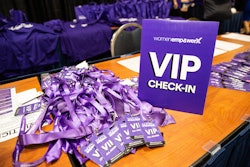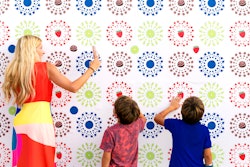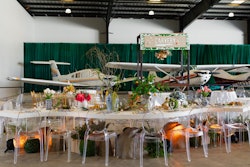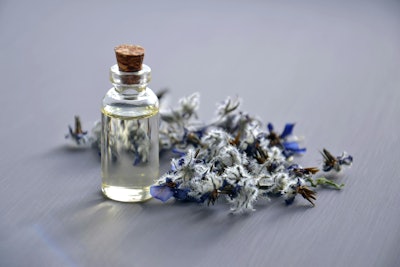
When you walk into a Graduate Hotels property, you might find yourself transported back to your college library—and not just because of the decor.
The Hilton-owned brand partnered with Nashville-based fragrance house Ranger Station to create a custom scent named "Newstalgia," which is used in the hotels' public spaces. The fragrance aims to evoke the leather-bound books, parchment, and earthy grass of a campus quad—blended with vibrant, citrusy notes to channel the enthusiasm of young college students.
Hilton leans into scents as a storytelling component at many of its properties. The brand’s Conrad Los Angeles, for example, uses a custom scent that evokes the ambrette, magnolia, and cedarwood notes one might find in Southern California, while Spain's Hotel Montera Madrid, Curio Collection by Hilton, pumps notes of cedar, walnut, amber, and fig plus hints of saffron through the hotel’s ventilation system. 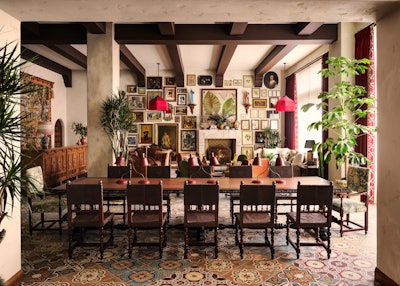 The Newstalgia scent was developed specifically for the Graduate Hotels brand; it's used in public spaces and sold as a candle. (Pictured: Graduate Palo Alto, which opened in January 2023 in Northern California.)Photo: Courtesy of Graduate Palo Alto
The Newstalgia scent was developed specifically for the Graduate Hotels brand; it's used in public spaces and sold as a candle. (Pictured: Graduate Palo Alto, which opened in January 2023 in Northern California.)Photo: Courtesy of Graduate Palo Alto
Many event professionals are taking a cue from the hospitality world and incorporating scent into their events too.
Wait, I’m so busy thinking about all the other senses while planning an event. Do I really need to think about scent too?
The short answer: no! But when used correctly, scent can be a great add-on to further immerse attendees in a theme. Jennifer Pressimone, a clinical aromatherapist and the CEO of JennScents, often choreographs event scents and finds that smell can be a powerful way to affect mindset, mood, and motivation. “Event professionals I’ve worked with request scents to match two main goals: One is to relate scents to their theme, such as to inspire innovation at conferences, love at weddings, or burnout prevention at corporate events. The second is to provide a mental health support aspect such as stress relief, relaxation, and rejuvenation for an overall good feeling," she explains.
One event professional who has worked scents into her events is Rachael Casey, associate director of marketing for Nth Degree Events. In the past, she’s used it in sponsor or exhibitor rebook offices, helping promote a calm, welcoming environment where people want to linger. “We’ve also used it in track sessions to help combat afternoon fatigue,” she says. “When attendees have been in sessions all day, it can be hard to push through those last couple of hours. We’ve found success in using aromatherapy to increase alertness and attention.”
“Scent is very evocative,” Casey adds, “as it is the strongest of the five senses and tied most closely to memory. It can trigger a sense of nostalgia and help anchor attendees in the event experience and environment. Think of cool ocean breezes and pine forests (and the calming effects they connote). The smell of baking bread or cookies takes you to many people’s childhoods.”
How exactly does scent impact mood?
“Scent has a remarkable impact on mood and emotional well-being,” says Johanna Lacy, director of operations for Candlefish, a retail store that specializes in fragrance exploration and the art of candle-making. The company often works with event professionals to craft bespoke scents for events in the form of custom-made candles.“Certain fragrances can evoke feelings of relaxation, joy, or invigoration, depending on their aromatic profiles,” Lacy explains. “For instance, lavender and chamomile are known for their calming properties, making them ideal for serene, intimate gatherings. On the other hand, citrus and mint fragrances can invigorate and uplift, perfect for energizing a lively party.” 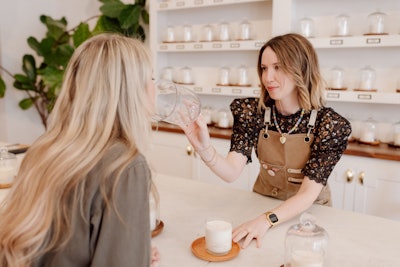 When Candlefish is tasked with creating a custom event scent, Lacy and her team begin with a comprehensive consultation, where they learn the event’s theme, desired ambiance, and the client’s personal preferences. Then, the team pours through its 100-candle library and fragrance profiles to find the right blend.Photo: Lizzy Rollins Photo for Candlefish
When Candlefish is tasked with creating a custom event scent, Lacy and her team begin with a comprehensive consultation, where they learn the event’s theme, desired ambiance, and the client’s personal preferences. Then, the team pours through its 100-candle library and fragrance profiles to find the right blend.Photo: Lizzy Rollins Photo for Candlefish
Pressimone likes using scents at the beginning of an event to help set the tone, calm social anxiety, and get people focused. During the event, meanwhile, scent can help energize attendees and keep them motivated. "For conferences, it can improve mental clarity, memory recall, and productivity," she says. "Post-event, scents dispersed as the attendees are leaving and checking out can reinforce the overall feeling of the event’s experience and combat any event fatigue.”
“Having a signature event or company scent used throughout the event can reinforce event branding and memories of that experience,” Pressimone adds. “It also opens an additional revenue stream of selling the signature scent before, during, and after the event.”
What role does catering play in event scent?
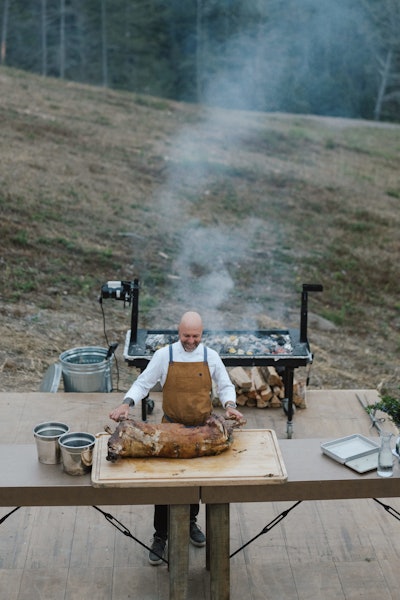 “One of our favorite ways to cook is outside with open-air culinary activations,” says Parragué Barclay. “In these instances, catering can create an impactful and memorable visual moment, as well as an olfactory experience. Our lamb rotisseries, for example, with burning rosemary add a natural smoky, delicious smell to an event—while also keeping insects away.”Photo: Laura Gordon Photography
“One of our favorite ways to cook is outside with open-air culinary activations,” says Parragué Barclay. “In these instances, catering can create an impactful and memorable visual moment, as well as an olfactory experience. Our lamb rotisseries, for example, with burning rosemary add a natural smoky, delicious smell to an event—while also keeping insects away.”Photo: Laura Gordon PhotographyWhen an event organizer does want the smell of food incorporated into the event experience, Parragué Barclay always encourages it to be done thoughtfully. “Chef-attended stations can create a sensory experience; imagine the rich, nutty aroma of brown-butter pasta cooking right in the room," she says. "Or when barbecuing, we might add bundles of fresh rosemary or other herbs to the fire, enhancing the atmosphere with earthy and herbaceous notes. On warm days in Napa Valley, we often greet guests with cool hand towels scented with lavender oil, providing a calming and refreshing welcome. These thoughtful touches can significantly enhance the hospitality experience.”
What are some more go-to scents I should consider?
For events, the Candlefish team typically recommends a mix of classic and versatile fragrances that can appeal to a wide audience. “Florals like rose and jasmine add a touch of elegance and romance, ideal for weddings or sophisticated soirees," says Lacy. "Fresh, clean scents like eucalyptus and sea salt are perfect for modern, minimalist events, providing a crisp and inviting ambiance. For cozy, intimate gatherings, warm notes of vanilla, sandalwood, and amber can create a comforting and welcoming environment.""Ultimately, the choice of scent should reflect the event's theme and the desired mood, ensuring a harmonious and pleasant experience for all attendees," she adds. 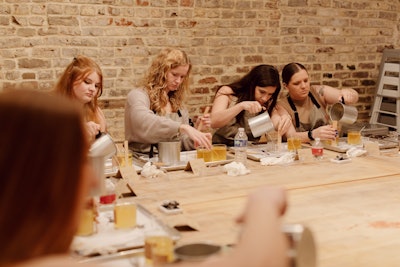 “Balancing the intensity of scents is crucial to avoid overwhelming or irritating guests,” says Lacy, noting that the focus should be on creating subtle, layered fragrances that enhance rather than dominate the environment.Photo: Lizzy Rollins Photo for Candlefish
“Balancing the intensity of scents is crucial to avoid overwhelming or irritating guests,” says Lacy, noting that the focus should be on creating subtle, layered fragrances that enhance rather than dominate the environment.Photo: Lizzy Rollins Photo for Candlefish
Pressimone recommends working with a trained aromatherapist to ensure you create the best aroma experience possible—without overwhelming your attendees' olfactory system. “Types of scents used make a huge difference,” she says. “For example, pure essential oils create a better wellness and olfactory experience than synthetic fragrances, which can trigger certain allergies and headaches."
That’s a good point about overwhelming guests or triggering allergies. How can I avoid that?
When choreographing scent into an event, consider the environment, the size of the room, lighting, sound, and other smells, suggests Pressimone. Think about placing scent stations away from food stations, and using mood lighting to reinforce the feel of the scent. "Placing scents away from loud stage speakers can help attendees enjoy the scent better," she adds. "Having it near relaxing music can reinforce the relaxing scent feeling.”In short: Make sure the aroma is subtle and designed to complement—not compete with—other sensory elements like sound and lighting, Casey advises. For many attendees, particularly neurodiverse attendees, light and sound can already be overwhelming. “We don’t want to add to that sense of overwhelm,” she says. “When used in a subtle way, scent can enhance the space without having an overwhelming impact.”
It's also important to consider guests with physical issues that might be triggered by fragrances. Pressimone likes to have event hosts send a survey to attendees during their onboarding or RSVP process to ask if they have any allergies. “That list is then forwarded to the scent choreographer or event planner to ensure those scents are not used in the blend, and/or that a disclaimer is sent to attendees beforehand and signage is included at the event,” she says.
Janet Jay, communications specialist for the U.S. Pain Foundation and a frequent blogger about disabilities including migraine disease, also cautions planners to not go overboard when it comes to scents. “Depending on what stats you look at, somewhere between 1 in 7 or 1 in 10 people deal with migraines or some sort of chronic headache disorder,” Jay points out. “For them, scent can be a real problem—and can create an environment that might be completely inaccessible to them.”
Her advice? Try to limit the scent to certain areas of the event, or have a scent-free zone where people can retreat if they’re feeling uncomfortable. If possible, she adds, give attendees a heads-up that fragrances will be used. “That way, those with sensitivities can plan ahead, whether that’s taking medication or deciding not to come,” she explains. “As an added bonus, it’s a way to brag about your cool signature fragrance before the event starts!”




